How to Avoid Grill Flare-Ups
Grilling, particularly on those sunny summer days, brings a unique joy. The tantalizing taste of delicious, barbecued food enjoyed in the great outdoors is hard to resist. But there's a pesky problem every ardent griller encounters - flare-ups. These sudden flame bursts can not only disrupt your grilling but can also pose safety risks. Many attribute these to the grill, but they primarily result from a lack of maintenance, accessories, and certain foods. This blog post will provide a comprehensive guide on how to avoid grill flare-ups.
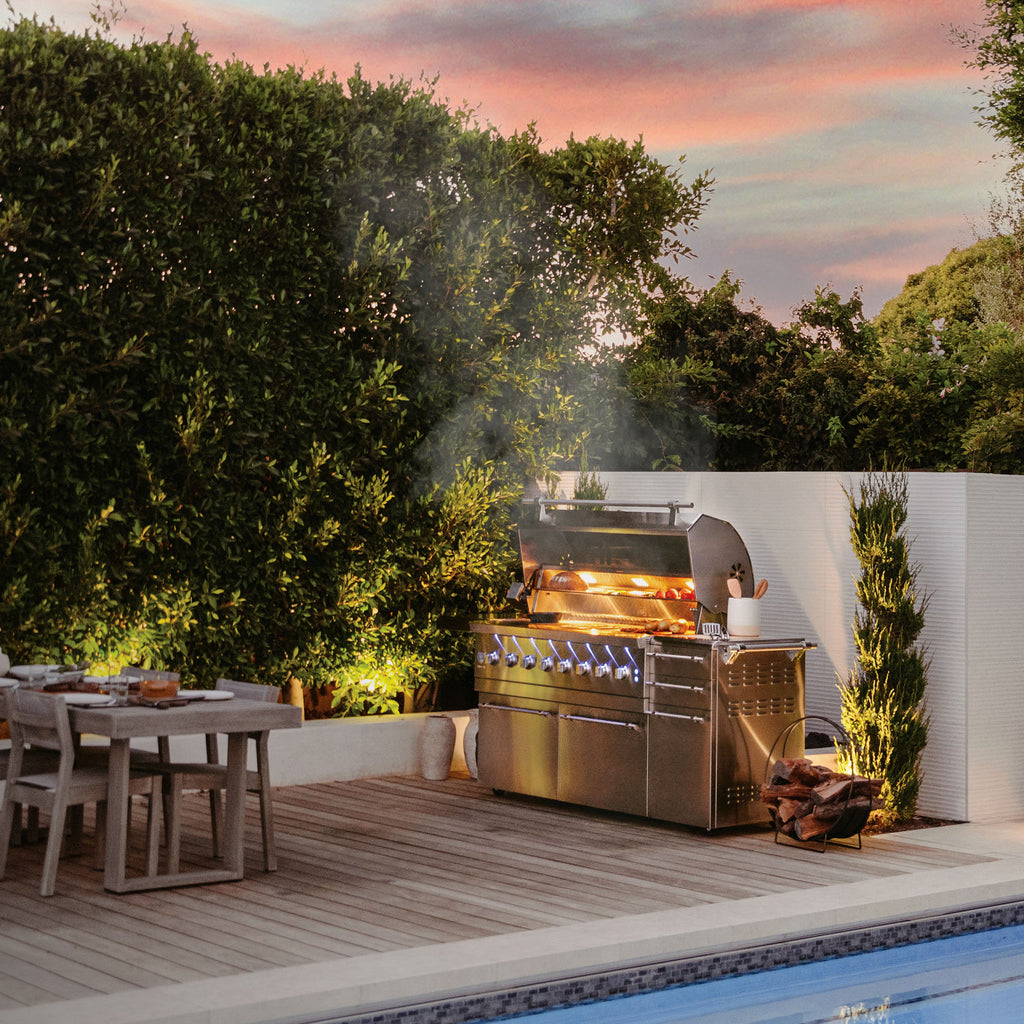
Why Grill Flare-Ups Happen
Outdoor grilling offers a fun and scrumptious way to serve meals for yourself, loved ones, or guests. However, even veteran grill masters can face the unwelcome surprise of a flare-up. Fat is the primary culprit behind these flame surges. When fat drips onto the coal or burners, flames ascend, burning the food. Flare-ups are most often caused by dripping fat, oil, or marinade but also occur when the lid is left open while searing fatty foods or during windy grilling days.
Even though gas grills are less prone to flare-ups than charcoal grills, they aren't immune. As seasoned grill experts, we suggest taking necessary precautions, such as employing barriers or radiants, to prevent flare-ups from spoiling outdoor cooking sessions. High-grade barriers, such as ceramic briquettes in the Atlas and Estate Series, shield food from direct heat and flare-ups. They also ensure uniform heat distribution across the grill surface and protect your burners.
Preventing Grill Flare-Ups
Flare-ups can strike anyone, but specific measures can help reduce their occurrence. Here are some helpful tips to lower the chances of a flare-up ruining your grilling session.

Keeping Your Grill Clean
A grill brush will help you efficiently remove debris or grease accumulated from past cooking sessions. Regular grill cleaning drastically minimizes flare-ups. It's essential to clear out the radiants, heat plates, ceramic briquettes, or barriers monthly, mainly if your grill sees frequent use. Performing an in-depth clean-up of your grill firebox and grease trap at least once or twice a year is also crucial. With these simple cleaning tips, you'll be set to serve tasty grilled meals while keeping flare-ups at bay.
Trimming Extra Fat
Trimming extra fat off your meat before putting it on the grill is a handy way to stave off flare-ups. Whether steaks with large fat caps, burgers, or skin-on chicken, foods with high-fat content tend to drip more, thus increasing the chances of flare-ups. By trimming off any extra fat or skin (anything beyond ¼ inch from the edges), flare-ups can be reduced, making your dish healthier. A little preventive action can ensure a safe and enjoyable grilling session.
Marinating Sensibly
While marinating meat enhances its flavor, it can also heighten the chances of flare-ups. To avoid this, pat your marinated meat dry with a paper towel before grilling it. Also, ensure the marinade doesn't drip off your food onto the heat plates and burners, as excess oils and marinades can easily catch fire and cause flare-ups. By following these simple suggestions, you can relish a grilling experience free of flare-ups and serve up delicious meals every time!
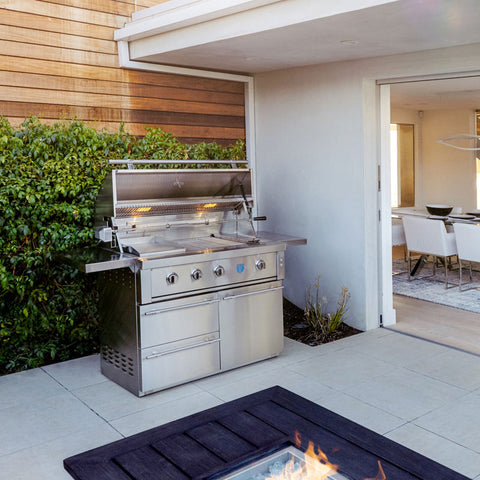
Using a Drip Pan
Positioning a drip pan under the grates is an effective solution. This stops fat drippings from reaching the heat source and results in lesser fat burning, thus leading to fewer flare-ups. Using a drip pan is especially beneficial for food items that are more prone to causing flare-ups.
Set up a drip pan when using a rotisserie attachment on your grill. Excess fat dripping off the rotisserie can cause flare-ups, which damage your grill over time and spoil your food. A drip pan beneath will prevent flame bursts and allow you to collect tempting drippings for gravy or side dishes like roasted potatoes.
Controlling Heat
Maintaining a low to medium temperature reduces the possibility of flare-ups. Avoid putting food directly over the heat source. Instead, use indirect heat, which involves switching off one side of the grill and placing the food on the other. For further details on using this method with your grill, browse our post about direct and indirect heat.
Preheating your grill appropriately is a crucial step in the grilling process that can help avoid flare-ups. By ensuring your grill reaches the required temperature before cooking, you can burn off any residue from previous sessions and prevent food from sticking. Believe us; preheating isn't a step to be overlooked!
Never Leave Your Food Unattended
One of the simplest ways to prevent flare-ups is to remain close after placing food on the grates. Don't walk away too soon, as most flare-ups occur shortly after food is added to the grill or immediately after the food is flipped. By staying nearby and monitoring your grill, you can ensure your food cooks evenly and is free from unappetizing surprises.
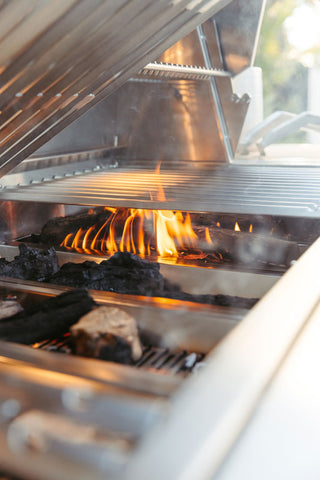
Managing Grill Flare-Ups
Even if you're a master griller, occasional flare-ups are inevitable. They can occur despite the most thorough clean-up and maintenance practices. However, remember that flare-ups can be easily managed with a few quick actions. If you face a flare-up, remain calm. Start by shifting your food out of the area and adjusting the heat. If your grill has a temperature gauge, set it to a lower heat setting to regulate the flames.
- Moving Food Away from the Heat Source: When a flare-up occurs, moving your food off the heat source is the first action. Keep it off the grill until the flames subside, then put it back once everything has cooled down.
- Closing the Lid: If the flare-up is substantial, close the lid to deprive it of oxygen. This will quell the flame and help extinguish the fire more swiftly. Remember to wait for the grill to cool down before you open the lid again.
- Waiting It Out: Most minor flare-ups will settle down naturally. So, stay calm and wait until the fire dies down.
- Turn Off Your Grill: If all else fails, cut off all remaining oxygen to the firebox by turning off the gas or charcoal. This should be your last resort to guarantee your safety and others' safety around you.
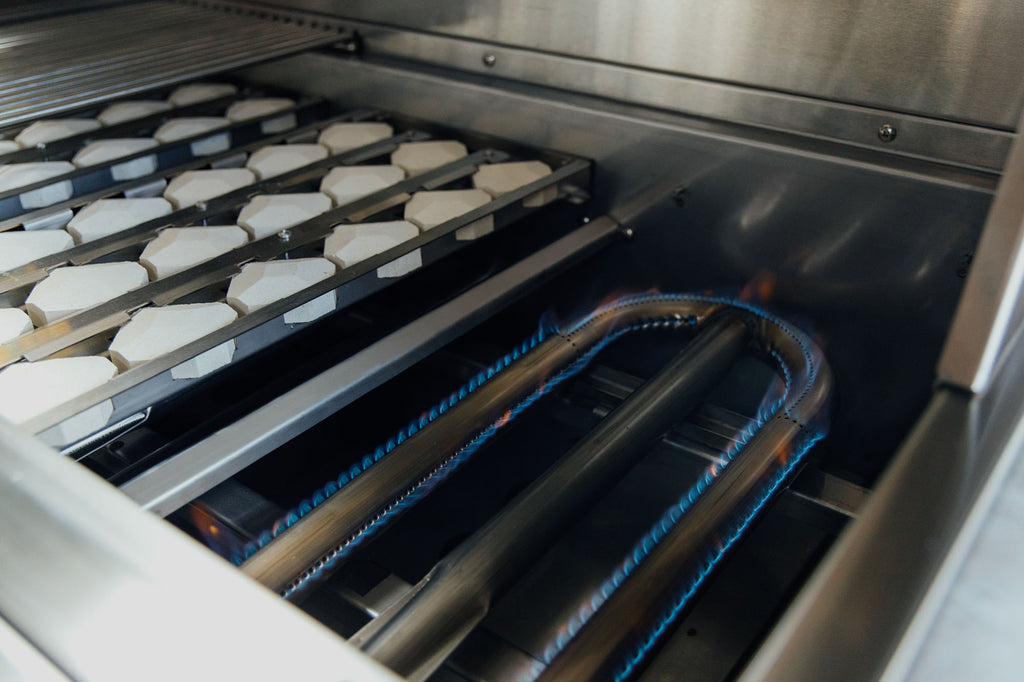
Keep Flare-Ups at Bay with the Ultimate Upgrade
What if we told you there's an upgrade to help control and minimize grill flare-ups? It's as simple as swapping your current heat shield or burner cover with ceramic briquettes!
Ceramic briquettes distribute heat more uniformly than their metal counterparts, leading to superior cooking results and fewer flare-ups. Ceramic briquettes also have superior heat retention, ensuring your food cooks evenly and thoroughly. They're easy to clean and outlast traditional heat shields.
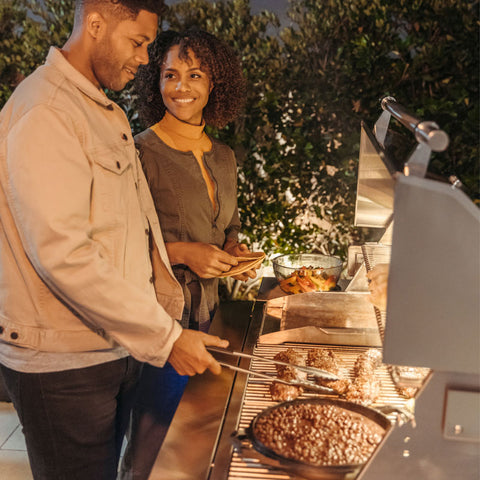
Here's to Grilling Without Flare-Ups!
Understanding the factors that can cause a grill flare-up is crucial to ensuring a delicious and safe grilling experience. Most often, a flare-up is not caused by your grill but rather by grease, oils, or marinade that drips off your food and onto the grill.
There's no need to worry, though, as you can take several simple steps to prevent this. First, keep your grill clean and free from excess debris. Next, carefully prepare your food and avoid adding excessive marinades or oils that can increase the chances of a flare-up. Preheating your grill correctly and staying close after adding food can also help you control the heat. And if a flare-up does occur, stay calm! Shift the offending item to a cooler area or off the grill, letting it cool down.
Following these grilling tips, you can confidently serve perfectly grilled meals every time.




